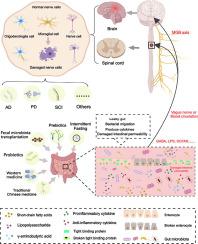Advances in molecular mechanisms and therapeutic strategies for central nervous system diseases based on gut microbiota imbalance
IF 11.4
1区 综合性期刊
Q1 MULTIDISCIPLINARY SCIENCES
引用次数: 0
Abstract
Backgroud
Central nervous system (CNS) diseases pose a serious threat to human health, but the regulatory mechanisms and therapeutic strategies of CNS diseases need to be further explored. It has been demonstrated that the gut microbiota (GM) is closely related to CNS disease. GM structure disorders, abnormal microbial metabolites, intestinal barrier destruction and elevated inflammation exist in patients with CNS diseases and promote the development of CNS diseases. More importantly, GM remodeling alleviates CNS pathology to some extent.
Aim of review
Here, we have summarized the regulatory mechanism of the GM in CNS diseases and the potential treatment strategies for CNS repair based on GM regulation, aiming to provide safer and more effective strategies for CNS repair from the perspective of GM regulation.
Key scientific concepts of review
The abundance and composition of GM is closely associated with the CNS diseases. On the basis of in-depth analysis of GM changes in mice with CNS disease, as well as the changes in its metabolites, therapeutic strategies, such as probiotics, prebiotics, and FMT, may be used to regulate GM balance and affect its microbial metabolites, thereby promoting the recovery of CNS diseases.


基于肠道微生物群失衡的中枢神经系统疾病分子机制和治疗策略的研究进展
中枢神经系统(CNS)疾病严重威胁人类健康,但中枢神经系统疾病的调控机制和治疗策略仍有待进一步探索。研究表明,肠道微生物群(GM)与中枢神经系统疾病密切相关。中枢神经系统疾病患者体内存在肠道微生物群结构紊乱、微生物代谢产物异常、肠道屏障破坏和炎症升高等问题,并促进中枢神经系统疾病的发生。更重要的是,GM 重塑可在一定程度上缓解中枢神经系统病变。在此,我们总结了转基因在中枢神经系统疾病中的调控机制,以及基于转基因调控的中枢神经系统修复潜在治疗策略,旨在从转基因调控的角度为中枢神经系统修复提供更安全、更有效的策略。转基因的丰度和组成与中枢神经系统疾病密切相关。在深入分析中枢神经系统疾病小鼠体内转基因变化及其代谢产物变化的基础上,可采用益生菌、益生元和FMT等治疗策略来调节转基因平衡并影响其微生物代谢产物,从而促进中枢神经系统疾病的康复。
本文章由计算机程序翻译,如有差异,请以英文原文为准。
求助全文
约1分钟内获得全文
求助全文
来源期刊

Journal of Advanced Research
Multidisciplinary-Multidisciplinary
CiteScore
21.60
自引率
0.90%
发文量
280
审稿时长
12 weeks
期刊介绍:
Journal of Advanced Research (J. Adv. Res.) is an applied/natural sciences, peer-reviewed journal that focuses on interdisciplinary research. The journal aims to contribute to applied research and knowledge worldwide through the publication of original and high-quality research articles in the fields of Medicine, Pharmaceutical Sciences, Dentistry, Physical Therapy, Veterinary Medicine, and Basic and Biological Sciences.
The following abstracting and indexing services cover the Journal of Advanced Research: PubMed/Medline, Essential Science Indicators, Web of Science, Scopus, PubMed Central, PubMed, Science Citation Index Expanded, Directory of Open Access Journals (DOAJ), and INSPEC.
 求助内容:
求助内容: 应助结果提醒方式:
应助结果提醒方式:


